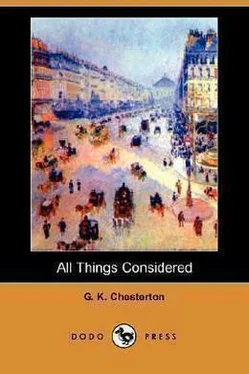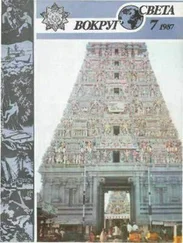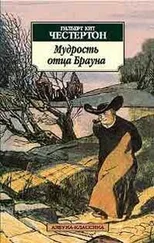There is another way of flattering important people which has become very common, I notice, among writers in the newspapers and elsewhere. It consists in applying to them the phrases "simple," or "quiet," or "modest," without any sort of meaning or relation to the person to whom they are applied. To be simple is the best thing in the world; to be modest is the next best thing. I am not so sure about being quiet. I am rather inclined to think that really modest people make a great deal of noise. It is quite self–evident that really simple people make a great deal of noise. But simplicity and modesty, at least, are very rare and royal human virtues, not to be lightly talked about. Few human beings, and at rare intervals, have really risen into being modest; not one man in ten or in twenty has by long wars become simple, as an actual old soldier does by long wars become simple. These virtues are not things to fling about as mere flattery; many prophets and righteous men have desired to see these things and have not seen them. But in the description of the births, lives, and deaths of very luxurious men they are used incessantly and quite without thought. If a journalist has to describe a great politician or financier (the things are substantially the same) entering a room or walking down a thoroughfare, he always says, "Mr. Midas was quietly dressed in a black frock coat, a white waistcoat, and light grey trousers, with a plain green tie and simple flower in his button–hole." As if any one would expect him to have a crimson frock coat or spangled trousers. As if any one would expect him to have a burning Catherine wheel in his button–hole.
But this process, which is absurd enough when applied to the ordinary and external lives of worldly people, becomes perfectly intolerable when it is applied, as it always is applied, to the one episode which is serious even in the lives of politicians. I mean their death. When we have been sufficiently bored with the account of the simple costume of the millionaire, which is generally about as complicated as any that he could assume without being simply thought mad; when we have been told about the modest home of the millionaire, a home which is generally much too immodest to be called a home at all; when we have followed him through all these unmeaning eulogies, we are always asked last of all to admire his quiet funeral. I do not know what else people think a funeral should be except quiet. Yet again and again, over the grave of every one of those sad rich men, for whom one should surely feel, first and last, a speechless pity—over the grave of Beit, over the grave of Whiteley—this sickening nonsense about modesty and simplicity has been poured out. I well remember that when Beit was buried, the papers said that the mourning–coaches contained everybody of importance, that the floral tributes were sumptuous, splendid, intoxicating; but, for all that, it was a simple and quiet funeral. What, in the name of Acheron, did they expect it to be? Did they think there would be human sacrifice—the immolation of Oriental slaves upon the tomb? Did they think that long rows of Oriental dancing–girls would sway hither and thither in an ecstasy of lament? Did they look for the funeral games of Patroclus? I fear they had no such splendid and pagan meaning. I fear they were only using the words "quiet" and "modest" as words to fill up a page—a mere piece of the automatic hypocrisy which does become too common among those who have to write rapidly and often. The word "modest" will soon become like the word "honourable," which is said to be employed by the Japanese before any word that occurs in a polite sentence, as "Put honourable umbrella in honourable umbrella–stand;" or "condescend to clean honourable boots." We shall read in the future that the modest King went out in his modest crown, clad from head to foot in modest gold and attended with his ten thousand modest earls, their swords modestly drawn. No! if we have to pay for splendour let us praise it as splendour, not as simplicity. When next I meet a rich man I intend to walk up to him in the street and address him with Oriental hyperbole. He will probably run away.
In these days we are accused of attacking science because we want it to be scientific. Surely there is not any undue disrespect to our doctor in saying that he is our doctor, not our priest, or our wife, or ourself. It is not the business of the doctor to say that we must go to a watering–place; it is his affair to say that certain results of health will follow if we do go to a watering–place. After that, obviously, it is for us to judge. Physical science is like simple addition: it is either infallible or it is false. To mix science up with philosophy is only to produce a philosophy that has lost all its ideal value and a science that has lost all its practical value. I want my private physician to tell me whether this or that food will kill me. It is for my private philosopher to tell me whether I ought to be killed. I apologise for stating all these truisms. But the truth is, that I have just been reading a thick pamphlet written by a mass of highly intelligent men who seem never to have heard of any of these truisms in their lives.
Those who detest the harmless writer of this column are generally reduced (in their final ecstasy of anger) to calling him "brilliant;" which has long ago in our journalism become a mere expression of contempt. But I am afraid that even this disdainful phrase does me too much honour. I am more and more convinced that I suffer, not from a shiny or showy impertinence, but from a simplicity that verges upon imbecility. I think more and more that I must be very dull, and that everybody else in the modern world must be very clever. I have just been reading this important compilation, sent to me in the name of a number of men for whom I have a high respect, and called "New Theology and Applied Religion." And it is literally true that I have read through whole columns of the things without knowing what the people were talking about. Either they must be talking about some black and bestial religion in which they were brought up, and of which I never even heard, or else they must be talking about some blazing and blinding vision of God which they have found, which I have never found, and which by its very splendour confuses their logic and confounds their speech. But the best instance I can quote of the thing is in connection with this matter of the business of physical science on the earth, of which I have just spoken. The following words are written over the signature of a man whose intelligence I respect, and I cannot make head or tail of them—
"When modern science declared that the cosmic process knew nothing of a historical event corresponding to a Fall, but told, on the contrary, the story of an incessant rise in the scale of being, it was quite plain that the Pauline scheme—I mean the argumentative processes of Paul's scheme of salvation—had lost its very foundation; for was not that foundation the total depravity of the human race inherited from their first parents?…. But now there was no Fall; there was no total depravity, or imminent danger of endless doom; and, the basis gone, the superstructure followed."
It is written with earnestness and in excellent English; it must mean something. But what can it mean? How could physical science prove that man is not depraved? You do not cut a man open to find his sins. You do not boil him until he gives forth the unmistakable green fumes of depravity. How could physical science find any traces of a moral fall? What traces did the writer expect to find? Did he expect to find a fossil Eve with a fossil apple inside her? Did he suppose that the ages would have spared for him a complete skeleton of Adam attached to a slightly faded fig–leaf? The whole paragraph which I have quoted is simply a series of inconsequent sentences, all quite untrue in themselves and all quite irrelevant to each other. Science never said that there could have been no Fall. There might have been ten Falls, one on top of the other, and the thing would have been quite consistent with everything that we know from physical science. Humanity might have grown morally worse for millions of centuries, and the thing would in no way have contradicted the principle of Evolution. Men of science (not being raving lunatics) never said that there had been "an incessant rise in the scale of being;" for an incessant rise would mean a rise without any relapse or failure; and physical evolution is full of relapse and failure. There were certainly some physical Falls; there may have been any number of moral Falls. So that, as I have said, I am honestly bewildered as to the meaning of such passages as this, in which the advanced person writes that because geologists know nothing about the Fall, therefore any doctrine of depravity is untrue. Because science has not found something which obviously it could not find, therefore something entirely different—the psychological sense of evil—is untrue. You might sum up this writer's argument abruptly, but accurately, in some way like this—"We have not dug up the bones of the Archangel Gabriel, who presumably had none, therefore little boys, left to themselves, will not be selfish." To me it is all wild and whirling; as if a man said—"The plumber can find nothing wrong with our piano; so I suppose that my wife does love me."
Читать дальше








